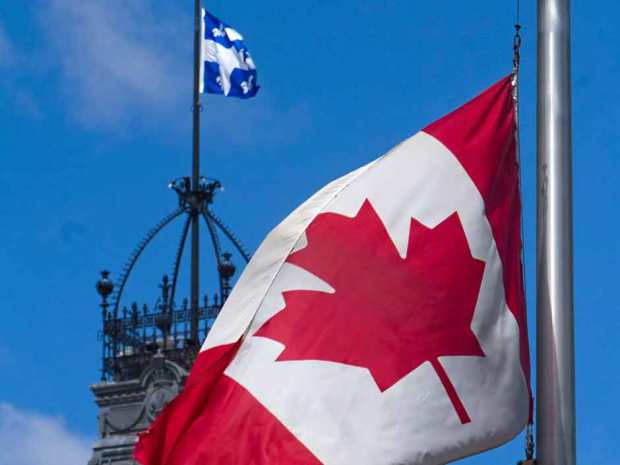Those who think Quebec is dependent on Canada have it backwards; Quebec keeps Canada united
Canada is a camel of a country, an ungainly, confounding confederation of disparate regions that somehow combined to form one of the most successful countries on earth. It is a blessed oddity, “an historic accident” in the appreciative words of former Prime Minister Pierre Elliot Trudeau, who also characterized Canada as “a country built against any common, geographic, historic or cultural sense.”
Unlike Canada, Quebec is coherent: geographically, historically and culturally. Although many in English Canada deride Quebec for its dependence on Canada — the equalization payments it receives, its proposal to keep the Canadian dollar following independence — in truth Canada needs Quebec far more than Quebec needs Canada.
Imagine that Quebec voted for independence in a referendum that all agreed was clearly decided. The Canadian dollar would fall, investments would be put on hold, and chaos and confusion would immediately reign. But this immediate fallout would be as nothing once the long- term implications sunk in.
Canadian governments preemptively made concessions to Quebec to stave off its leaving
The post-referendum negotiations that would ensue would not be limited to the terms of Quebec’s departure from Canada — all the regions and provinces of Canada would examine their own role in the Canada that remained, and jockey for advantage. In the century and a half since Confederation, the provinces have never agreed to so much as free trade among themselves. The odds are slim that they would each put aside their long-standing grievances to happily come together in a lasting new partnership.
Take Newfoundland, which joined Canada only in 1949 and then only narrowly, after two bitter referenda, and on the expectation of being on the receiving end of pensions, family allowances and other federal government benefits. Newfoundland— like Quebec a distinct society and every bit a nation — is today a have province that subsidizes the rest of Canada. If Quebec leaves Canada, Newfoundlanders would almost surely agitate for a referendum of their own to revisit their decision to join Canada. Also like Quebec, Newfoundland’s is an export economy that sells mainly to the U.S. — trade with Canada’s other provinces takes a back seat in importance.
Albertans, who write by far the biggest equalization cheques to other Canadians, would also balk at signing on to a renewed Confederation that resembles the status quo — too many remember how the rest of Canada plundered them through the National Energy Program in the 1980s, and too many now resent the way they are being demonized for their tar sands. At a minimum, Albertans would want a new deal that didn’t make them subject to extortion from the very people they were supporting; more likely, they would question the prudence of joining a new untested union of uncertain future when, as an oil and gas exporting economy whose earnings come in U.S. dollars, their future on their own would be far more predictable.
British Columbia, too, that paradise on the Pacific, rich in natural resources, perfectly positioned to capitalize on the fast-growing Asian trade and closer in temperament to Washington State to the south than to Alberta to the east, could also pause at the prospect of re-Confederating.
A wild card in all this would be the U.S. In 1948, despite opposition from both Canada and the U.K., numerous members of Congress were open to Newfoundland joining the U.S. — with 100,000 American servicemen stationed on U.S. military bases in Newfoundland during World War II, the two had become close. Today, the U.S. would be leery of accepting a Canadian province into the union, for fear of upsetting the Republican-Democratic balance in Congress, but the U.S. could decide to make a simultaneous play for right-wing Alberta and left-wing BC — this was the formula that was acceptable to Republicans and Democrats in 1959, when Alaska (then Democrat leaning) and Hawaii (then Republican) joined the union.
The spectre of upheavals, even when viewed as a distant possibility, suffices to scare Canadian governments whenever Quebec separation becomes remotely plausible — they don’t want to come anywhere near these scenarios. For this reason, Canadian governments have consistently, preemptively made concessions to Quebec, to stave off any serious discussion of its leaving.
Trudeau himself anticipated these concessions would be necessary. “The reason we have a united country, the reason why it will stay united, is because the Canadian people everywhere are prepared to pay the price of that in money terms, in tax terms,” he stated in 1968.
Yet money from the rest of Canada may not be enough at some point in the future— when Quebec itself becomes a have province, as Newfoundland and Saskatchewan did in the last decade. Quebec has all the ingredients needed to be a prosperous country: a talented workforce, top-ranked universities, advanced industries, abundant natural resources — everything but the good governance required to bring it to Swiss or Swedish levels of economic competence. One day it will acquire that governance and assert its desire for independence.
The end game for Canada at that point, ironically, could be precisely the kind of EU-style sovereignty-association that Quebec has been arguing for. The alternative — the prospect of a breakup of Canada, with all the unknowns that would engender — would be sufficient to make us all grateful to keep Quebec in the fold, however loosely.
Lawrence Solomon is executive director of Urban Renaissance Institute. LawrenceSolomon@nextcity.com
Lawrence Solomon: Canada needs Quebec






























Laissez un commentaire Votre adresse courriel ne sera pas publiée.
Veuillez vous connecter afin de laisser un commentaire.
Aucun commentaire trouvé